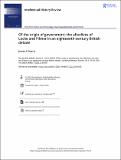Files in this item
Of the origin of government : the afterlives of Locke and Filmer in an eighteenth-century British debate
Item metadata
| dc.contributor.author | Harris, James A. | |
| dc.date.accessioned | 2023-01-20T11:30:01Z | |
| dc.date.available | 2023-01-20T11:30:01Z | |
| dc.date.issued | 2023-01-19 | |
| dc.identifier | 278637799 | |
| dc.identifier | 3cda84d6-4338-4357-acaa-9675e7cbb0ad | |
| dc.identifier | 85146696442 | |
| dc.identifier.citation | Harris , J A 2023 , ' Of the origin of government : the afterlives of Locke and Filmer in an eighteenth-century British debate ' , Intellectual History Review , vol. 33 , no. 1 , pp. 33-55 . https://doi.org/10.1080/17496977.2022.2147475 | en |
| dc.identifier.issn | 1749-6977 | |
| dc.identifier.other | ORCID: /0000-0002-0333-3754/work/127065638 | |
| dc.identifier.uri | https://hdl.handle.net/10023/26791 | |
| dc.description.abstract | This article describes a debate about the basis of allegiance to government that is obscured from view by the historiographical controversy about whether it is liberalism or republicanism that is the key to understanding eighteenth-century Anglophone political thought. This debate is between those who subscribe, more or less, to the principles of Locke, and those who subscribe, more or less, to the principles of Filmer. Taking the Hanoverian succession as my point of departure, I present an outline account of what I take to be the mainstream eighteenth-century argument about the origin of government, up to and including the aftermath of the French Revolution. It played out largely in sermons and occasional pamphlets, written by individuals who, for the most part, did not acquire significant reputations, even in their own age. I then turn to a succession of more familiar writers, from Hume to Burke, who sought to transform argument about the source of political legitimacy by abandoning the question of the origins of government in favour, usually, of considerations of utility. Yet, as they attempted to change the terms of debate about the principles of government, these writers made constructive use of ideas and arguments usually associated with Filmer. | |
| dc.format.extent | 23 | |
| dc.format.extent | 2055151 | |
| dc.language.iso | eng | |
| dc.relation.ispartof | Intellectual History Review | en |
| dc.subject | Political obligation | en |
| dc.subject | Locke | en |
| dc.subject | Social contract | en |
| dc.subject | Filmer | en |
| dc.subject | Patriarchalism | en |
| dc.subject | Utilitarianism | en |
| dc.subject | B Philosophy (General) | en |
| dc.subject | JC Political theory | en |
| dc.subject | T-NDAS | en |
| dc.subject | MCC | en |
| dc.subject.lcc | B1 | en |
| dc.subject.lcc | JC | en |
| dc.title | Of the origin of government : the afterlives of Locke and Filmer in an eighteenth-century British debate | en |
| dc.type | Journal article | en |
| dc.contributor.institution | University of St Andrews. St Andrews Institute of Intellectual History | en |
| dc.contributor.institution | University of St Andrews. Philosophy | en |
| dc.identifier.doi | 10.1080/17496977.2022.2147475 | |
| dc.description.status | Peer reviewed | en |
This item appears in the following Collection(s)
Items in the St Andrews Research Repository are protected by copyright, with all rights reserved, unless otherwise indicated.

